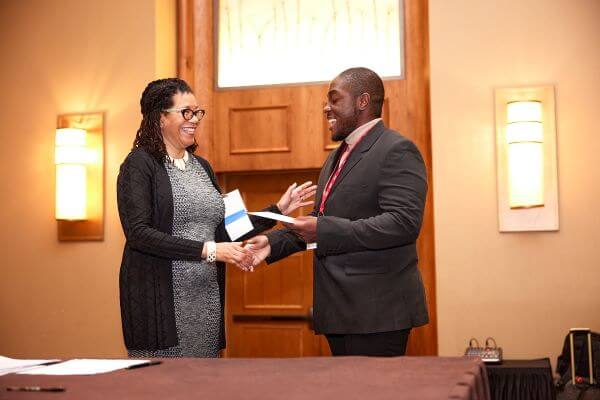
Houston obstetrician-gynecologist Carla Ortique, MD, says one of her top goals as the Texas Medical Association Foundation’s (TMAF) new president is getting the word out about how the foundation helps physicians and improves health care.
When Texas Medicine Today spoke with Dr. Ortique, she had just attended a luncheon at TexMed 2023 in Fort Worth where TMA and TMAF honored 16 incoming medical students for their $10,000 Diversity in Medicine Scholarships. The timing was fitting, she said, because the scholarships are funded by TMAF, and are the reason she started donating to the foundation.
“I don’t think people may be aware of what [the foundation] does,” she said. “Because when they attend the [annual TMAF gala at TexMed] or a luncheon like this, we hear responses such as, ‘Oh, wow, I didn’t realize you were doing this. I’m happy to give and I want to give.’”
The nearly $180,000 TMAF grants annually in the Diversity in Medicine program helps offset the cost of medical school, which averages around $200,000 per student, Dr. Ortique said. Diversity in Medicine Scholarships are funded by TMA Foundation with generous support from its Bayardo Trust and Patrick Y. Leung, MD, Endowment, and in 2023 with major annual gifts from H-E-B and Baldemar Covarrubias, MD, as well as TMA county medical societies and physicians and their families.
“As I looked at the dollar amounts that were being awarded by this foundation, they were greater than several organizations specifically set up to assist minority students,” said Dr. Ortique, who also is now chair of the TMAF board. Like other board members, she supports the foundation's budget, fundraising, and goal-setting efforts, and ensures its policy, procedures, and philosophy are followed.
The foundation was created in 1966 to support the philanthropic vision of TMA members. In 1989, TMA expanded the foundation’s mission to fund TMA and TMA Alliance projects that help physicians and the public while engaging businesses and communities in a healthier Texas. Those programs include outreach initiatives like Vaccines Defend What Matters, Walk With a Doc Texas, Hard Hats for Little Heads, and Texas BookShare. They also include the Ernest and Sarah Butler Awards for Excellence in Science Teaching, TMA’s History of Medicine traveling exhibits, and the Louis J. Goodman Lectureship.
Likewise, TMAF provides grants that assist medical students and fund the community outreach initiatives of county medical society alliance and medical-student chapters. It also administers the John P. McGovern Champion of Health Award, which focuses on projects that address urgent public health issues.
The breadth of the foundation’s good works makes it a natural for another of Dr. Ortique’s priorities: expanding its base of corporate donors.
“We’ve had generous [corporate] sponsors over the years, like H-E-B,” she said. “But I feel there’s an untapped market. I believe there are a lot of corporate entities who are genuinely interested in improving health outcomes for their team members and communities. Many are truly interested in becoming donors and they have dollars that are set aside for philanthropic endeavors. … An easy case can be made to any corporate leader that contributing, regardless of their specific sector, helps improve the health of all Texans – improves the health of their workers.”
Dr. Ortique’s foundation work is just part of her long history of activism within TMA and in the state. She currently participates as a member of the Council on Science and Public Health; serves as a consultant to the Committee for Reproductive, Women’s and Perinatal Health; and is a past member of the Committee on Child and Adolescent Health.
She also is chair of the Texas Maternal Mortality and Morbidity Review Committee, which investigates the causes of maternal death and illness on behalf of the state.
Dr. Ortique, who has been on the TMAF board for six years, looks forward to working with fellow board members as part of such “a positive and hopeful entity.”
“I’m humbled and honored to serve alongside these amazing individuals,” she said. “I believe [we can] increase the endowment so that we can further increase the good work that we do supporting future physicians and the communities they serve.”